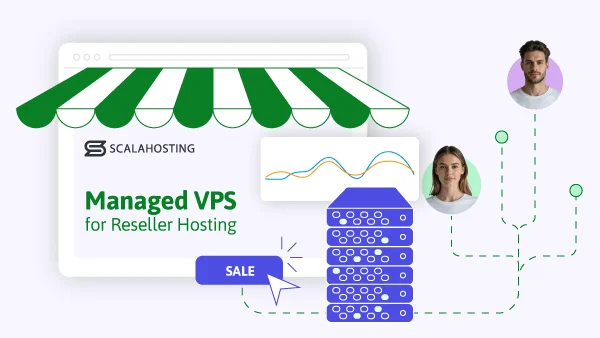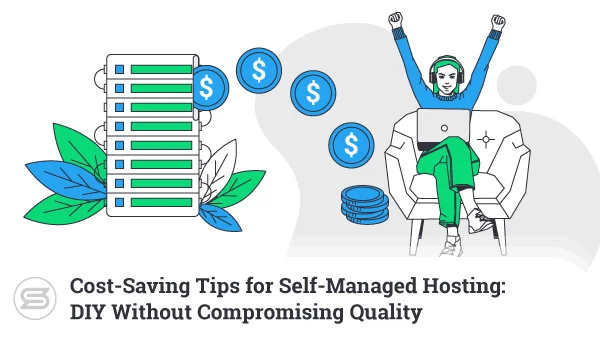Web hosting providers have been working for years to create a welcoming environment for users of all experience levels to join the online website game. Servers are getting faster, software solutions are getting more intuitive, and the packages are more affordable than ever.
That evolution largely relies on innovations.
Among other technological discoveries in the last couple of decades, cloud services are hands down one of the most revolutionary. Today, we are taking a closer look at cloud hosting, its characteristics, and how you can benefit from such a setup.
Let’s dive right in…
What is Cloud Hosting?
In a traditional hosting infrastructure, you have a physical server at the core, which powers one or many user accounts. Whenever hosts needed to upgrade the server, someone in the datacenter had to manually add more storage space drives or computing power.
That is before cloud technologies were introduced.
Commercially popularized in the early 2000s, the new architecture employed an entire network of interconnected computers over the Web acting as servers. This allowed for on-demand resource distribution and maximized uptime as you no longer had a single-point-of-failure to slow or stop your smooth site running.
The cloud in itself is not a separate type of hosting service. It’s more of an infrastructure setup, one that hosts can apply to all kinds of platforms.
What is Cloud VPS Hosting?
Let’s look at the typical VPS service for a moment. You’ve got a physical server that the web host separates into multiple virtual instances. Each VPS account gets its own share of server CPU, RAM, disk space, and for the client, it all feels like operating your own dedicated server.
Still, all virtual private servers are limited to the resources the physical machine can provide. That’s what makes the cloud setup so unique.
Employing a vast network of servers allows you to scale your resources to your precise requirements at any given time. Even if you are experiencing traffic spikes – you’ve got a limitless pool of computing power to handle the load.
A cloud VPS still sees you utilize a physical server to set up the virtual infrastructure. The big difference here comes from the source of system resources. Instead of loading a single machine, you’ve got hundreds, even thousands of other sources of CPU, RAM, and disk space. Speaking of storage, many VPS solutions are SSD-powered, meaning you can employ lightning-fast and reliable solid-state drives for your website needs.
IMPORTANT: Any hosting service can be powered by the cloud. This includes shared hosting, VPS, dedicated servers, app-specific hosting, reseller solutions, and more.
Cloud Hosting Architecture
The cloud computing architecture typically consists of a few components. You can often find:
- Front end – this is the part with which the user interacts. Typically represented by some kind of GUI (graphical user interface), it allows cloud clients to visualize the server infrastructure and perform essential tasks.
- Back end – this is where the biggest part of the cloud architecture resides. It is used to oversee all processes on the front end and their smooth running. Includes a huge number of interconnected servers, data storage systems, and more.
- Application – here, we include all platforms and software the client uses in the cloud. From a user perspective, there is no difference between a cloud-based app and a standard website. The distinction comes from the backend processes – all data storage and processing is handled by the cloud instead of a single physical server.
- Service – this encompasses all cloud-based services the users utilize. Similar to the applications, this aspect simply depicts the way users interact with web and data storage services in a cloud setup.
When it comes to the services, cloud computing offers different models for delivering them. Here are some of the essential ones you are likely to come across:
- Software-as-a-Service (SaaS) – instead of users having to download and store an app locally, the SaaS model sees the provider hosting those applications over the cloud. The client connects and operates the services via an internet connection. Common examples are Google Apps and Dropbox.
- Platform-as-a-Service (PaaS) – similar to the SaaS model. here we can get an entire platform stacked with web solutions to manage from everywhere. The cloud service provider ensures the server, network, and storage while the end user can focus on software deployment. Magento Commerce Cloud is a bright example of the PaaS model.
- Infrastructure-as-a-Service (IaaS) – this one is the full package. The cloud provider gives you the entire infrastructure, including the network, servers, and other components. The user is simply responsible for managing their cloud apps. Amazon Elastic Compute Cloud (EC2) and Google Compute Cloud (GCE) are two notable IaaS services.
Now that we know the basics of the cloud architecture let’s see how it can benefit our web hosting needs.
Top Benefits of Cloud Hosting
Having a giant network of interconnected servers at your disposal inevitably brings a lot of cool advantages. When looking for a reliable hosting plan, the cloud can give you:
- Optimized performance – the cloud architecture balances your server between multiple POPs (points of presence). This allows the system to serve your content much faster and without any hiccups, even during high traffic. Perfect for heavy-traffic business websites and online shops.
- Maximized uptime – optimal connectivity is never an issue when you’re utilizing cloud VPS hosting. Even if your physical server suffers from an attack or hardware issue – there are plenty more instances that have a working copy of your website to display. Ideal for mission-critical web projects.
- Immense resource scalability – you can monitor your resource consumption at all times when utilizing a cloud host. When you see that you are close to reaching any limits – be it storage space, CPU, or RAM – you can easily add more and keep things running smoothly. Often useful for fast-growing websites and when launching marketing campaigns.
- Backup and disaster recovery – an important part of your cybersecurity, backups are always best stored on a secure offsite location. Utilizing a cloud hosting service means you have plenty of options to store your site copies and retrieve them whenever needed.
- Flexible pricing structure – cloud VPS packages are as affordable as they come. This is largely because of the flexibility in billing. You no longer need to overpay for resources you are not using. The advanced scalability proves very beneficial in this aspect, allowing site owners to carefully plan their budget in advance.
IMPORTANT: To maintain optimal cost-efficiency, it’s important to always monitor your resource consumption. Neglecting your usage and its root causes can easily see your cloud costs spiral out of control.
Public vs Private Cloud Hosting
The last couple of decades have seen many different cloud models emerging. That’s less than surprising, considering the immense adoption and subsequent development of the technology.
When the time comes to deploy your cloud services, you can generally fit most projects on four different models:
- Public Cloud
The most common type of cloud deployment. As in the shared hosting type of service, the provider offers a pool of resources to multiple users via the internet. All clients utilize the same pool without having actual access to the cloud infrastructure.
This model is the most affordable, easiest to operate, and limitless in terms of scalability. No extra maintenance costs and efforts are involved.
- Private Cloud
Large enterprises and big commercial projects often take advantage of the private cloud model. It involves hosting the entire cloud infrastructure in an on-premise datacenter or on multiple colocation facilities. Private cloud solutions are highly secure and are completely regulation-compliant to the latest standards. A big plus is the full control over the cloud infrastructure.
- Hybrid Cloud
Taking the best out of both worlds, the rise of hybrid cloud adoption seems quite natural. This model is often regarded for its customization flexibility and maximized efficiency while maintaining high security levels. Employed as a vital stepping stone when switching between public and private cloud architecture. The only downside is its added complexity in terms of cloud configuration.
- Multi-Cloud
When utilizing the cloud, you are not even limited to using a single vendor. You can easily consolidate the services of multiple providers in a multi-cloud model, benefiting from enhanced flexibility and load balancing. All market leaders like Microsoft Azure, Amazon AWS, and Google Cloud all have different strong selling points, and you can combine all their benefits into one platform.
IMPORTANT: Rapidly growing technologies like Kubernetes allow for easier management on a multi-cloud infrastructure.
Each of those cloud models carries its own set of advantages but also serves different types of web projects. Make sure to carefully outline your needs when researching potential cloud VPS providers.
Managing Your Cloud VPS Server
Virtualization is at the heart of cloud computing. In a typical cloud hosting environment, the client gets access to a virtual machine that runs on a network of servers (the cloud). Depending on your experience with VPS management, you can choose between two main types of hosting services:
- Managed VPS – your cloud setup is under the direct management of your hosting provider. The trained support team is involved in most technical tasks – server configuration, maintenance, updates, and software installation. Should any technical issues arise along the way – you can trust your host’s expertise. Simplified to the maximum, this solution is best suited for users with little to no experience in cloud VPS management.
- Self-Managed VPS – a hosting service fancied by most web developers and users with advanced technical knowledge. Your hosting provider gives you a bare-metal server with root control permissions, allowing you to customize every little aspect of the VPS to your exact requirements. Configuring the operating system, GUI, security software, and all the needed cloud applications is entirely in your hands.
What Kind of Websites Use Cloud Hosting?
The high performance and uptime are great selling points for any potential cloud hosting user, but some online projects will naturally reap more benefits.
For example, commercial projects like ecommerce shops strongly rely on simplifying the shopping experience and bringing customers through the sales funnel more efficiently. Such websites cannot afford a minute of downtime as this can have a devastating impact on sales.
Even if you’re not necessarily selling something, you can still manage a high-traffic website that grows faster than a traditional setup can handle. The cloud hosting scalability can easily handle resource-intensive projects without breaking a sweat, so it’s well-preferred among various corporate enterprises.
The examples of suitable use cases for cloud VPS hosting are more than a few. Other possibilities include:
- Social networking services
- Multimedia streaming websites
- Document sharing tools
- CRM platforms
- IoT projects
- Big data analysis
Why Does Cloud Hosting Stand as the Best Hosting Solution?
Even though cloud services are not a separate type of web hosting service per se, they can be applied to pretty much any other option on the market. This versatility, combined with the system resource abundance, makes cloud technologies the most efficient choice for multiple projects.
When comparing a cloud VPS to a cloud shared hosting environment, for example, you can expect all the benefits associated with virtual private servers:
- Performance boost
- Better customization control
- Dedicated system resources
- Hardened security
- Scalable RAM, CPU, and disk space
Analogically, there are distinct advantages of a cloud VPS vs dedicated servers:
- Easier management
- Much more cost-effective
- Vast network of servers
Acting as a middle ground between hosting types, the cloud VPS may very well be the most flexible solution of them all. It brings you enough server power, security, and control to modify the environment to your liking. Of course, the final decision should always be taken according to your specific needs and budget.
IMPORTANT: You can find cloud servers priced as low as $5-10/mo. In comparison, even the most affordable bare-metal dedicated server will see you pay around $50 every month.
ScalaHosting Cloud VPS Hosting
NVMe SSD
-
OK
-
OK
-
OK
-
Automatic Offsite Backups
-
UNMETERED Bandwidth
NVMe SSD
-
OK
-
OK
-
OK
-
Automatic Offsite Backups
-
UNMETERED Bandwidth
NVMe SSD
-
OK
-
OK
-
OK
-
Automatic Offsite Backups
-
UNMETERED Bandwidth
NVMe SSD
-
OK
-
OK
-
OK
-
Automatic Offsite Backups
-
UNMETERED Bandwidth
All ScalaHosting VPS solutions are cloud-based. This way, we ensure your customers with a stable environment that allows for easy website growth without any performance compromises.
But that’s just scratching the service.
You can choose between a wide variety of virtual servers provided by Scala and Amazon AWS. Even the lowest-tier servers will guarantee you 1 CPU core, 2 GB RAM, and 50 GB SSD space with easy upgrade options when you start growing.
IMPORTANT: Each of our partners offers a few fixed plans. But if you choose one of the ScalaHosting VPS plans – you can fine-tune each of your server resources to build a completely custom server solution.
The deals get even sweeter if you choose a managed cloud VPS plan. You will not only get a ton of extra perks – dedicated IP, SSL certificates, daily backup solution – but save a ton from control panel licensing costs.
This is all thanks to SPanel.
Scala’s very own complete hosting management platform lets you operate all essential aspects of the cloud service – files, databases, emails, domain names, installed apps, and many more. The platform is quite lightweight, meaning it doesn’t put any extra strain on your web server. You will find a few custom-built tools as well, like SShield (for server security) and SWordPress Manager (for easy WP management).
But best of all – managed VPS customers get this whole bundle absolutely free of charge, saving them heaps in unnecessary licensing fees.
Conclusion
Where flexibility is concerned, you will struggle to find a better choice than cloud hosting. It offers a robust architecture where you take advantage of an entire network of servers around the world. This creates a limitless pool of system resources where you always have plenty available for your website.
Contact the ScalaHosting support team if you want to learn more about our cloud solutions.
FAQ
Q: How does cloud hosting differ from traditional hosting?
A: In a traditional hosting environment, a website’s data is hosted on a single server. By contrast, on a cloud hosting plan, the files and databases are stored on multiple different servers that are connected to a single cloud. A virtual machine running on these servers is responsible for serving the content and keeping the website accessible.
Q: What are the main benefits of hosting my website in the cloud?
A: The distributed approach reduces the risk of downtime caused by hardware or network problems. Your website performance isn’t directly dependent on a single server, and because every account has a predetermined set of hardware resources, you don’t need to worry about any of the other projects hosted on the same cloud causing any problems.
You can easily get more resources without migrating your website to a different server, and the additional flexibility means that you don’t need to pay for hardware you won’t use.
Q: Can my website be hosted in the cloud?
A: Yes, it most likely can. The virtual machine that is responsible for serving the content mimics a regular server. It can host different web applications and be configured to fit your specific needs. If you go for a self-managed cloud hosting package, you can even choose which operating system it’s going to use.
Q: Is cloud hosting more expensive than traditional hosting?
A: If you just compare monthly prices for cloud vs traditional hosting plans, the numbers will most probably favor the shared environment. That’s natural, considering the cloud setup is more powerful, more secure, and gives guaranteed resources.
What’s more important when looking at the prices is cost-effectiveness, and here is where cloud VPS plans excel. For just a few more dollars a month, you are securing a much more reliable environment for any web project.
Q: Are cloud-hosted websites faster than the ones hosted on traditional hosting plans?
A: There are a number of different factors that play a role in the load times for websites. Even the geographical proximity between end-users and the data centers hosting the websites can have a significant effect. Generally speaking, however, there are a few aspects of cloud hosting that enable websites to run better. The distributed approach makes load balancing easier, meaning that properly configured servers are unlikely to be put under too much pressure. Hosting accounts that reach their limits in terms of server resources can’t exceed them, and they can’t affect the performance of other accounts hosted on the same server network.
Q: Can a cloud VPS scale?
A: Cloud solutions can not only scale – this is one of their prime advantages. The vast network of servers ensures you can always add resources on the go and keep your websites fast and responsive. Instead of upgrading your hosting package, you can simply opt-in for more RAM, disk space, or whatever you currently need.
This enhanced scalability works great for businesses on a budget, allowing them to only pay for only what they’re utilizing.
Q: How often is my cloud server backed up?
A: Depending on your hosting provider, you can get different options when it comes to backups. As this is an essential part of your security strategy, you want to have as many recent backups as possible kept safely on an offsite location.
ScalaHosting gives cloud VPS clients the opportunity to easily manage their archives through SPanel. Create scheduled backups, custom backups, or restore a previous copy of your website – everything is just a couple of clicks away.
What is a VPS – Everything you need to know!



